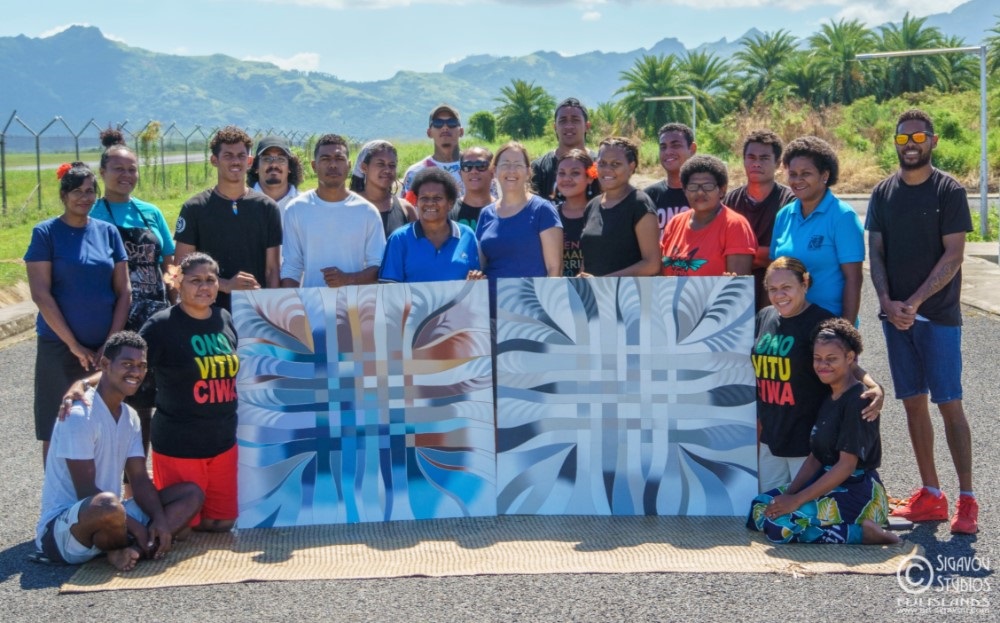“I never cease to enjoy my daily dose of bliss and immense pleasure looking at my paintings… I am blown away by the beautiful transformation they have made to my home.”
This message from a recent art customer based in New Zealand highlights one of the most rewarding experiences of working as a local visual artist: creating connections through a shared love of art and all things Fijian!
At Sigavou Studios, a family-owned enterprise spearheaded by awardwinning artist, Maria Rova, it is enthusiastic feedback like this that makes all the hard work and perseverance of the last years feel so worthwhile.
With views of Nadi’s airport runway, the studio cuts a fresh and colourful figure at Namaka Industrial Estate, where it relocated after more than 20 years of operating from the Rova family home. Like many other small businesses in the furore of COVID-19, Maria had to send staff home and think of new ways to survive when the pandemic’s first wave hit in 2020. “Looking back, there was so much confusion, anxiety and no definite time frame of how long the shutdowns would last,” Maria recalled.
As a visual arts business tightly connected with Fiji’s tourism industry, closed borders spelt disaster, but also a chance to breathe in, evaluate, and forge plans to build back stronger once the crisis abated.
“I really lent on the support of the Women Entre-(WEBC) to adapt and look at ways of business continuity. In this dark period, there have been positive takeaways in terms of upskilling, discovering new tools and resources, and just having the support of the WEBC and its network.”
Sigavou’s signature mediums include dyes on silk and traditional barkcloth sourced from female kin in Ekubu on the island of Vatulele.
The purchase of rolls of hand-crafted masi vulavula by Sigavou not only empowers women to support their families; the partnership plays a role in keeping ancient cultural traditions alive.
“Pioneering viable creative livelihoods has always been one of our core missions. Indigenous art forms are more likely to be preserved and revived when they are part of value chains that provide sustainable incomes in our 21st century economy,” reflects Maria as she smooths out a piece of textured white masi and outlines her next design.
Maria joined WEBC in 2015 and used the lull of COVID-19 to build capacity and find solutions through online discussions and workshops alongside fellow WEBC members. It would be an important period of adaptation and preparation for new doors that would open.
In 2021, a commission involving 300 pieces of handpainted art for the guest rooms of a rebranded fivestar resort property, unexpectedly propelled the studio into a larger premises.
An artist recruitment drive brought out astounding hidden talents in a lineup of creatives who, prepandemic, had worked as aircraft engineers, musicians, tour reservationists, and cruise-boat cleaners.
The joy of finding meaningful work once again was contagious, and Team Sigavou was finally on a roll, with light at the end of the tunnel!
A year on, Sigavou’s new premises is re-imagining what a creative Fiji destination experience should entail.
The studio has recently opened the doors of its new showroom, welcoming art lovers from around the world.
Here, visitors find a colourful range of original art that draws inspiration from the country’s natural environment and cultural heritage.
A chance to observe local artists at work adds to the experience of walking into an authentic hub of homegrown creativity. Customers delight in the opportunity to invest in Fijian Made treasures, imbued with stories and memories that will last a lifetime.
In vernacular Fijian, Sigavou means “new day”, and true to its name, this creative hub has found a new chapter after a historically turbulent pandemic.



